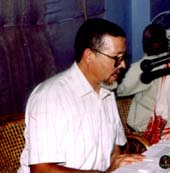 |
| Picture by S.H. Patgiri |
He chronologically and meticulously traces the history of the land of his roots. David Reid Syiemlieh, a professor of history at the North Eastern Hill University (Nehu), Shillong, is a dedicated teacher and a scholar whose time is spent in lifting the veil off the misty history of the northeastern region.
?My coming to Guwahati is a hill man?s foray into the plains along the Brahmaputra,? he laughed. ?I have always enjoyed my stints in Guwahati, especially on the Gauhati University campus,? he added.
?Gauhati University, the Mecca of learning in the region, has pioneering contributions towards building up an educational environment in this part of the country,? he gushed.
During his recent visit to the city to deliver a lecture on the foundation day of the northeastern regional centre of the Indian Centre of Historical Research (ICHR), Syiemlieh threw light on the lesser-known topic of the settlement of the Indo-Portuguese population in the Northeast.
?My interest on the Indo-Portuguese population was generated while researching on the Holy Cross congregation. During the course of the material collection, I had the opportunity to reside for some days in two of the villages of the Indo-Portuguese. There I met the residents, took notes and acquainted myself with their present situation,? he said.
?Realising that so little is known of the community, I incorporated some of their past in They Dared to Hope: The Holy Cross Congregation in India, wrote two articles on Mariamnagar (a village of the community) in Neiha Proceedings and a longer article in a book in honour of a friend. My presentation in Guwahati is an update on these publications,? he added.
Syiemlieh has been teaching modern Indian history at the Nehu since 1979. He had started his education at the pristine locales of Kalimpong?s Dr Graham?s Homes School and finished his post-graduation in history from the Nehu. For several years, he was the general secretary of the North East India History Association, with which he has been associated since its inception.
He is the author of books like British Administration in Meghalaya: Policy and Pattern (1989), A Brief History of the Catholic Church In Nagaland (1990), They Dared to Hope: The Holy Cross Congregation in India and two other books.
He has edited several other volumes of books and contributed innumerable articles in reputed international and national journals. He has also won several scholarships from the Charles Wallace India Trust Grant for research in United Kingdom.
Other honours include a British Council grant, a senior Fulbright fellowship from the University of Notre Dane and a few more from some foreign universities.
?The historical tradition of the region is very conducive for peace and harmony. Every aspect of the region from its people to the landscape is closely bonded and there is something great about the feeling of solidarity among one and all,? he said.
?History has a lesson to teach. It is one of the most liberal branches of social sciences,? he said.
?History is not just about flipping through the pages of a calendar and neither it is the process of digging the death from beneath the soil. In fact, history teaches us to learn and rectify from the mistakes committed in the past,? he added.
?When a nation is not aware of its history, how can it march ahead in future? History of a nation is its backbone to stand in the present and to carry forward its journey in the future.?
Syiemlieh wins the heart of his students and peer groups with his charm, his charisma and oodles of sense of humour.
?Although I am a teacher, I like the idea of being a trusted friend first and then a guide or a philosopher,? he smiled.
?I find every thing about Guwahati similar to my hometown Shillong except the scorching sun here.?
?The fury of the Brahmaputra during the summer is an indication of its eternal strength,? he added.
?I would like to visit Guwahati again and again even if not invited,? he signed off.
Maitreyee Boruah










